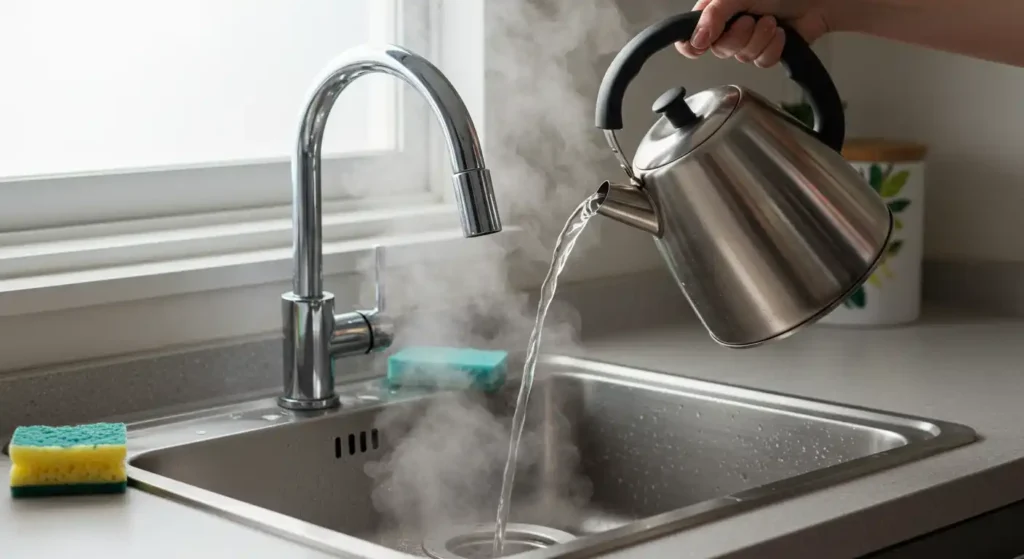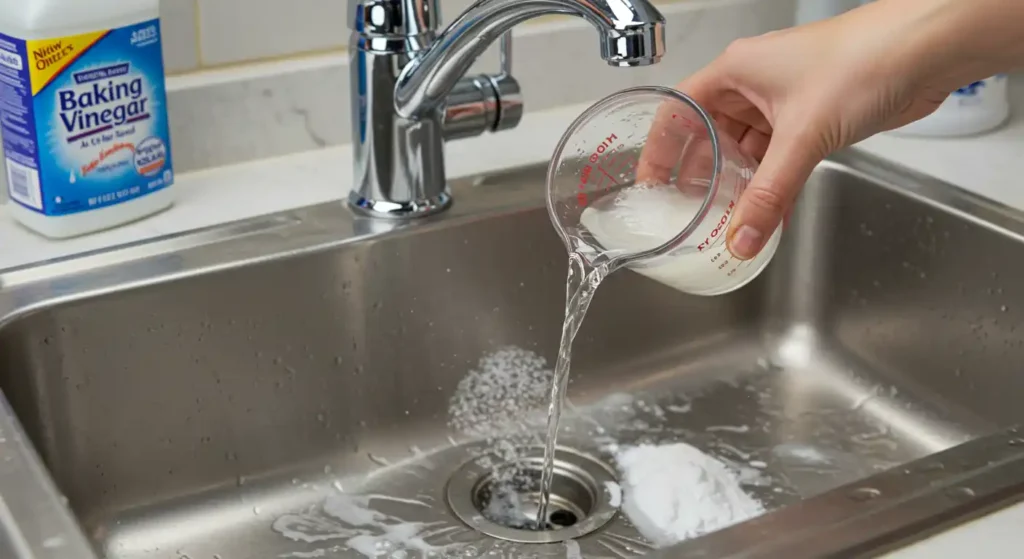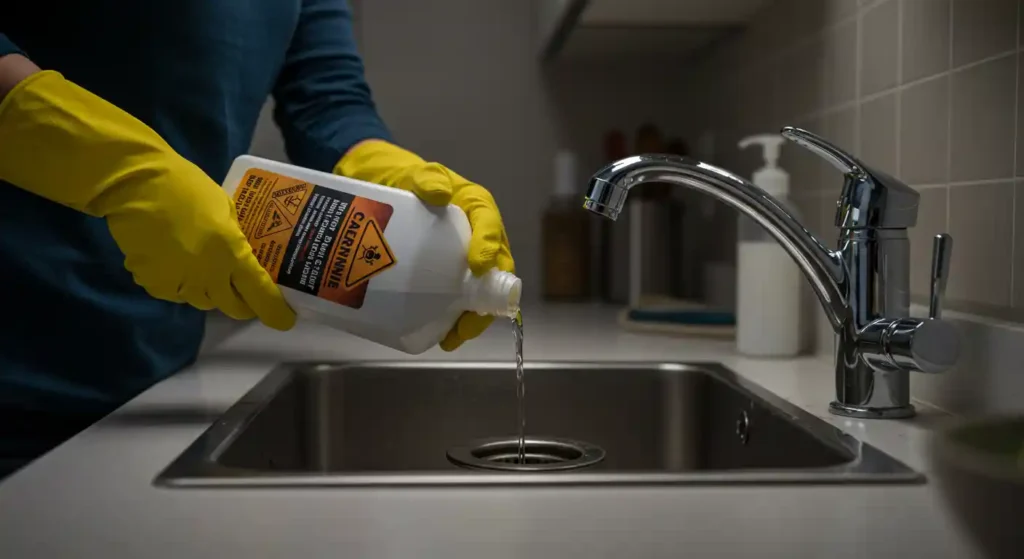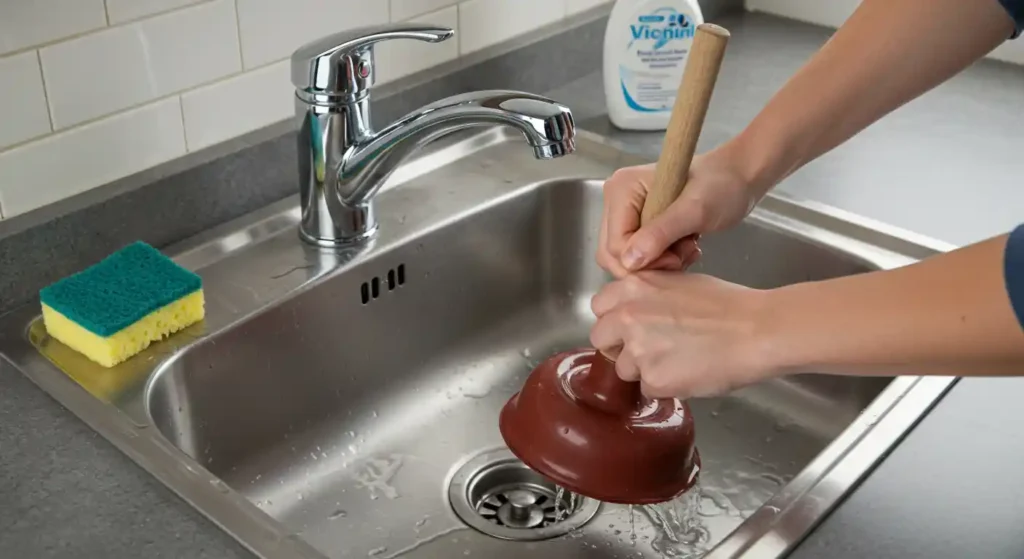
A blocked sink can be frustrating because it disrupts daily activities like washing dishes or cleaning. It’s an urgent problem that needs an urgent solution, and there are several things you can try at home to unblock it.
If you’re unsure what to do, we’re a professional plumbing company with years of experience, and we’ve tried many methods. We’re going to share these tips with you so you can try them and fix the block Sink.
What Causes a Blocked Sink?
A blocked sink can happen for several reasons, most of which are easy to avoid with some care. Here are the main causes that you must know:
1. Food Scraps: One of the biggest reasons we notice for a blocked kitchen drain is food scraps going down the sink. When we wash the dishes, small bits of food can get stuck in the pipes and build up over time, creating a blockage. To avoid the blockage in the first place, make sure to always use a drain cover or dispose of food scraps in the rubbish bin instead of the sink.
2. Grease and Oil: When you pour grease, oil, or fat down the drain, it can solidify as it cools and form a thick layer inside the pipes. This can trap other debris, causing a blockage. Instead, make sure to dispose of grease in a container and throw it away in the rubbish.
3. Hair: Hair is another common cause of blocked bathroom sinks. When you wash your hair, strands can fall into the drain and mix with soap, creating a sticky mass that clogs the pipes. To avoid this, make sure to use a drain cover, or cleaning the drain regularly can help prevent the issue.
4. Soap Scum: Soap and shampoo can leave behind a sticky residue, known as soap scum, which builds up over time and can cause a blockage. To avoid this, make sure to rinse the sink, and using a drain cleaner can help keep the pipes clear.
You can also explore this article how to choose the best plumber in Melbourne’s Eastern suburbs
how to unclog a kitchen sink with standing water?
You can easily fix a blocked sink by yourself if you follow these methods.
1. Boiling Water

Boiling water is a simple and effective way to clear a blocked sink, especially if the clog is caused by grease, soap, or food build-up. To use this method, you need to start by boiling a kettle of water. Once it’s boiling, make sure to carefully pour it down the drain in small amounts, allowing each pour to sit for a few seconds. This helps break down any grease or soap scum stuck in the pipes. The hot water will loosen the blockage, and it will flow down the drain. If the water doesn’t drain right away, you may need to repeat the process once or twice. Boiling water is safe for most pipes except PVC and works well for minor blockages. However, if the blockage doesn’t clear, you might need to try other methods or contact a professional plumber.
2. Vinegar & Baking Soda

Vinegar and baking soda are great for clearing blocked drains. This method works well for light blockages caused by soap, food, or even hair. Here’s how you can use them:
First, pour about half a cup of baking soda down the drain. Then, pour half a cup of vinegar on top. You will hear a fizzing sound that means the mixture is working to break up the blockage. Let it sit for about 15 minutes, then rinse it with hot water.
This method is safe for most types of pipes, and it’s a natural way to keep your drain clear without using harsh chemicals. If the drain is still blocked after using this method, you may need to try something else or call a plumber for help.
3. Caustic Cleaner

If the boiling water and vinegar & baking soda method isn’t working, caustic cleaners can help. These are strong chemicals that can clear tough blockages in your drains. They work by breaking down grease, food, and other stubborn clogs. To use a caustic cleaner, you must follow the instructions on the label carefully.
Typically, you’ll pour the cleaner into the drain and let it sit for a while to dissolve the blockage. After waiting, rinse the drain with hot water to clear out the cleaner and any debris.
While effective, caustic cleaners can be harsh on your pipes and dangerous to handle, so always wear gloves and eye protection. If you don’t feel comfortable using these chemicals, or if the blockage is still there, it’s best to call a plumber for help.
4. Plunger

The first three methods work without a plunger. A plunger is one of the most common tools used to fix a blocked sink. It works by creating pressure to push the clog out of the pipes. To use a plunger, you can start by filling the sink with enough water to cover the bottom of the plunger. Then, place the plunger over the drain and push down firmly. Next, pull it up quickly, creating a suction effect. Repeat this process several times, pushing and pulling the plunger to break up the clog.
You have to Make sure the plunger has a good seal around the drain to get the best results. If the clog is not too deep in the pipes, a plunger can usually clear it quickly. However, if the blockage doesn’t clear after a few attempts, it might be a sign that the clog is more serious and you may need to call a professional plumber.
Call the Experts in Ringwood, VIC
If you’ve tried all the simple methods and your sink is still blocked, it’s time to call the experts in Ringwood, VIC. Our Professional plumbers have the experience and the right tools to deal with tough blockages quickly and safely. At Pro Action, our plumber can fix problems like deep clogs, broken pipes, or anything else causing the blockage. Don’t hesitate to reach out to a local plumbing expert in Ringwood for reliable service.
How to Prevent Clogged Sinks and Drains in the Home?
Preventing clogged sinks and drains is all about being careful about what goes down them. Here are some simple steps that can help you to keep your drains clear:
- Don’t Pour Grease Down the Sink: Grease can harden in the pipes and cause a clog. Instead, pour it into a container and throw it away.
- Use Drain Covers: In the kitchen, bathroom, or shower, use drain covers to catch food scraps, hair, and other debris that could cause blockages.
- Clean Your Drains Regularly: Once a week, rinse your drains with hot water to help clear away soap, grease, and other build-ups. You can also use a mixture of baking soda and vinegar to clean the pipes naturally.
- Avoid Flushing Non-Flushable Items: Never flush things like paper towels, wipes, or cotton balls down the toilet. These items can get stuck and cause blockages.
- Remove Hair from Drains: After showering, remove hair from the drain to prevent it from building up. You can also use a hair catcher to keep hair out of the pipes.
If you’re dealing with other plumbing emergencies, check out our article How to Fix a Burst Water Pipe for essential repair tips.
Conclusion.
In conclusion, a blocked sink can be annoying, but there are several ways to fix it at home using simple methods like boiling water, baking soda, or a wire hanger. If these don’t work, or if the problem is more serious, calling a professional plumber in Ringwood, VIC, is a good idea. They have the tools and experience to clear the blockage safely and prevent further issues. Taking care
